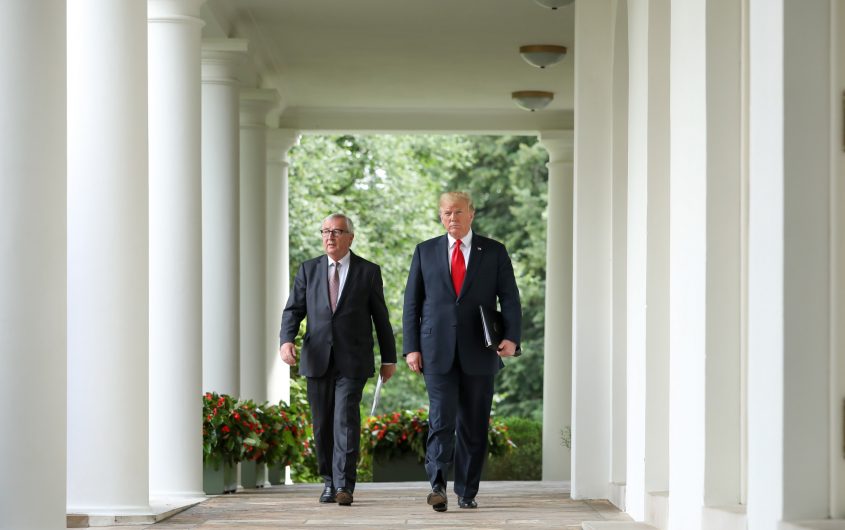
Samira Bouaou/The Epoch Times via Flickr
US–EU Trade Relations in the Trump Era: Which Way Forward?

Marianne Schneider-Petsinger
Chatham House
Marianne Schneider-Petsinger is geoeconomics fellow in the US and Americas Programme at Chatham House, responsible for analysis at the nexus of political and economic issues. Before joining Chatham House, she managed the Transatlantic Consumer Dialogue – an international membership body representing consumer organizations in the EU and US. She also worked on transatlantic economic issues at the American Institute for Contemporary German Studies (AICGS) in Washington, DC and at the Ministry of Economic Affairs in the German state of Thuringia. Her research interest lies in the area of trade and transatlantic economic cooperation. Marianne completed her graduate studies focusing on international trade and finance at the Fletcher School of Law and Diplomacy (Tufts University) and the John F Kennedy School (Harvard University). She holds a BA in International Affairs and Economics from the University of Maine. Marianne is originally from Germany and spent almost ten years in the US. She is now based in London.
She is a 2016-2017 participant in AICGS’ project “A German-American Dialogue of the Next Generation: Global Responsibility, Joint Engagement,” sponsored by the Transatlantik-Programm der Bundesrepublik Deutschland aus Mitteln des European Recovery Program (ERP) des Bundesministeriums für Wirtschaft und Energie (BMWi).
A research paper released by Chatham House recommends a framework for strengthening US-EU trade relations and achieving successful trade talks in the current era of protectionism.
US-EU Trade Relations in the Trump Era: Which Way Forward? identifies the drivers of President Trump’s trade policy toward the EU and its member states – in particular Germany. Whether forthcoming US-EU trade talks will be successful is far from assured, as both sides disagree on various issues – including whether to cover agriculture. Potential US tariffs on car imports in the name of national security represent the ultimate obstacle to a US-EU trade agreement, as they would trigger a suspension of negotiations.
The report is authored by Marianne Schneider-Petsinger, Chatham House Geoeconomics Fellow and an AGI Next Generation project alum. She proposes a multi-faceted, pragmatic approach aimed at both the transatlantic market and global challenges of common concern to the US and EU. Achieving quick progress on US-EU bilateral trade issues would strengthen any joint efforts on more systemic problems.
Summary
- Although the US and the EU remain each other’s largest trade and investment partners, there has latterly been some turbulence in transatlantic economic and political relations. A major source of friction have been the US tariffs on imports of steel and aluminium, introduced by the Trump administration in the name of national security, and the EU’s retaliatory tariffs. President Trump’s threat to impose tariffs of up to 25 per cent on imports of automobiles and automotive parts is on hold for now, but remains another source of tension. The EU and its member states also regard the Trump administration’s attitudes and actions towards the rules-based international trading architecture – especially the WTO – as a great challenge.
- A key driver of President Trump’s trade policy towards the EU and its member states – Germany in particular – is the large US trade deficit in goods. Trump and his team see the EU as both adversary and potential ally. Not only has the EU become a primary target of US trade action; it is also vulnerable to collateral damage in the US’s trade war with China. All the same, the US recognizes the EU as a potential partner in tackling unfair trade practices – widely understood to implicate China – and to reform the global trading system.
- Tensions over trade have been somewhat reduced since July 2018, when President Trump and European Commission President Juncker stepped back from the brink of a trade war. Subsequent steps by both the US and the EU have opened the door for future trade talks. For now, however, the two sides’ negotiating objectives diverge fundamentally in their potential scope – especially on whether to include agriculture and the automobile sector.
- While the US administration has an interest in agreeing a US–EU trade deal to showcase President Trump’s deal-making abilities ahead of the US presidential election in 2020, the EU is interested in achieving a swift agreement primarily to forestall the potential imposition of automotive tariffs.
- Although new trade talks will not be a revival of the TTIP negotiations, many of the sticking points encountered during those negotiations are likely to resurface. Instead of a single-track undertaking, future US–EU trade talks might be more productively conducted via parallel tracks where each issue is addressed according to its own timetable.
- Critical to the success of future transatlantic trade negotiations will be whether the EU is able to speak with one voice when dealing with the US. Other recent US trade negotiations (in particular the new United States–Mexico–Canada Agreement – the successor to NAFTA) will also have an impact on US–EU talks. And beyond the pursuit of a bilateral free-trade agreement, the most significant issue for US–EU cooperation will be their capacity and willingness to work together, and with like-minded partners, to address global challenges of common concern.
- Building on a simulation exercise on US–EU trade talks in an era of protectionism, convened by Chatham House in September 2018, this paper concludes with a set of policy recommendations. A multifaceted approach aimed at both the transatlantic market and the global trading system could provide the best way forward in the current political and economic environment.
This paper was published by Chatham House. It is posted here with permission of the author.









